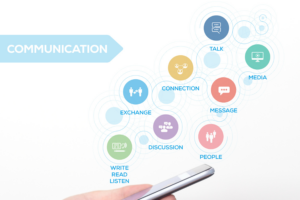
World Communications Week is celebrated in the first week of November each year.
Each day, we all use many forms of communication – verbal and non-verbal.
Communication is everywhere and happens each day through various forms and channels. These include visual, auditory, haptic, olfactory, electromagnetic, and biochemical.
We start communicating from the moment we are born, through noise and gestures which we rapidly develop as we get older.
How has communication evolved?
With the evolution of technology, the nature of communication changed forever.
Mobile phones and the internet revolutionised communication and the speed at which we communicate with one another digitally.
The internet has become a major form of communication this century. In addition, it has brought with it abbreviations and emojis to everyday conversation.
Today, the entire world seems to be online, and the internet and social media have played a massive part in the globalisation of everyday life and business. That’s why World Communications Week is so important.
How can we improve our communication during World Communication Week?
Although the internet and social media bring great benefits, it can also hinder communication.
The best communication often comes from face-to-face interaction. It can be hard to meet new people and learn about shared interests. However, there’s plenty of options to do so at college.
At college, you can meet peers and form deeper connections by getting involved in student clubs and events.
These could include philosophy/theories, boardgame, D&D and Students’ Union, among many others!
Communication plays a key role in our Learning Philosophy and Empowering Learning strategy and its strategic drivers. These include:
- Neuroscience
- Technology
- Globalisation
- Wellbeing
- Sustainability